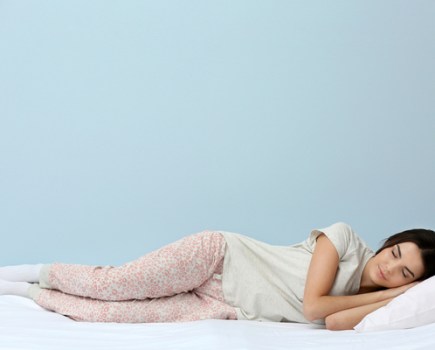Having had insomnia for several years, writer Sarah Rodrigues tried everything but to no avail… until she discovered CBD oil.
Only a few years ago, if you’d told someone you were taking ‘cannabidiol’ they’d have probably assumed you were smoking weed and getting high. But 2019 has seen cannabidiol (CBD, as it’s more commonly known) gain a whole new health-promoting reputation as products containing it fly off the shelves, from skincare and salad dressings to tinctures, edibles and sprays.
The CBD industry in the UK alone now generates around £50 million a year, and research suggests the number of people using CBD doubled between 2017 and 2018.
Last year, Holland & Barrett became the UK’s first high street retailer to stock CBD oil.
A few months later, the World Health Organisation (WHO) reported that CBD may ease the symptoms of conditions ranging from MS, Alzheimer’s disease and Parkinson’s, to pain, depression and anxiety.
Help with insomnia
The substance has also been shown to be effective in the treatment of insomnia, itself often an adjunct to mental health conditions.
But are such claims backed by any solid science or is it simply a case of fad substances and placebo effects? In 2017, an analysis of various clinical trials was published and co-authored by clinical scientist Kimberley A Babson (Cannabis, Cannabinoids, and Sleep: A Review of the Literature).
Promising research findings
Her conclusion was that yes, initial research is showing that medium-high-dose CBD is helping people improve their sleep. One reason for this may be that we are built to be receptive to the substance. Research shows the existence of two cannabinoid receptors in the body: CB1 and CB2, the former located mostly in the brain.
‘These receptors play a role in modulating neurotransmitter release in a manner that prevents excessive neuronal activity,’ explains Henri Sant-Cassia, of CBD Virtue (cbdvirtue.co.uk).
‘Suppressing this activity results in decreasing anxiety, as well as reducing pain and inflammation – all factors that, unchecked, may often contribute to sleep deprivation and insomnia.’
What about dosage?
So how much do you take? With brands and suppliers proliferating both online and on the high street, how are sleep-deprived shoppers to know what constitutes a ‘medium-to-high dose’ effective at tackling their sleep issues?
‘At this point in time, we can’t actually point to clinical data that outlines how often and how much CBD should be taken to improve sleep,’ acknowledges Jack Morrison, co-founder of CBD brand YourZooki (yourzooki.com).
‘The increase in its popularity for this purpose has been driven largely by anecdotal evidence, since historical stigmas surrounding cannabis have limited the number of studies on the subject.
‘We recommend starting with a lower dose and gradually increasing until you find the dose that works for you. We see the highest rate of repeat purchase with the 20 per cent and 40 per cent dosages and, based on customer feedback, it seems to work best when people have a dose in the morning and then again an hour before bed.’
More clinical trials planned
The brand is also in the process of arranging clinical trials on their own product, the results of which may shed more light on the optimal dose and time to take it.
Not all suppliers make the strength of their products clear, however, requiring some mental aerobics. A label stating 500mg CBD refers to the amount of CBD in the entire bottle, not per dose. Other labels may state 500mg per litre which, when applied to a 10ml bottle and then a 1ml dropper, is actually a dose far more miniscule than first impressions would suggest.
More helpfully, some products, such as CBD Virtue, state the ‘per-dropper’ amount, while YourZooki’s labelling is based on easy-to-fathom percentages.
Sleeping much better
Having spent years envying Sleeping Beauty (keep your handsome prince but could I please have even just a few of those hundred, somnolent, years?) I was eager to see whether CBD could help. Falling asleep was never an issue for me: staying asleep was my struggle, so I was on high alert for that 2am mental ‘ping!’
Following the instructions, I released a dropper-full of the liquid under my tongue shortly before bedtime, holding it there for around a minute before swallowing.
There was a faint aftertaste, but nothing unpleasant. Imagine my joy when the only ping I experienced was that of my alarm clock at 6.30am!
Power of suggestion? Perhaps, but I can honestly say that I have slept through just about every night since using CBD oil, other than a few nights when a head cold kept waking me up with breathing problems.
Help with anxiety too
Taking 10mg in the morning keeps my general anxiety in check, and a 40mg dose sees me off into dreamland.
As for the quality of my sleep, it’s perfect. My dreams aren’t trippy and I don’t feel drugged or heavy when I wake up.
Furthermore, because of the connotations of addiction that tend to go hand in hand with anything drug related, I’ve not taken it on planes with me just in case an official thinks it looks suspect.
However, on those occasions, my sleep has still been far better than it used to be. Perhaps one of CBD’s greatest short-term benefits is in simply allowing the body and mind to relax enough to learn to sleep again?
Until further research into sleep and CBD is done, it’s difficult to know what the facts around its efficacy are. For me, it’s been a lifesaver, and it seems certain that more and more people are going to wake up, so to speak, to the benefits of this healing oil.
So what’s in it?
There are 104 chemical compounds in the marijuana plant, including CBD and THC. Both are ‘Phyto-Cannabinoids’ and have a variety of physiological effects.
THC, however, is the compound that creates a ‘high’, while CBD is non-psychoactive. Although cannabis is listed as a Class B drug under the Misuse of Drugs Act 1971, CBD is not illegal as long as it contains less than 0.2% THC.
The presence of such trace quantities means you’d have to ingest an awful lot to get ‘high’ or fail a drugs test.
Few CBD products are pure so check the other ingredients. Often there’s taste-enhancing peppermint oil but animal gelatin will be problematic for vegetarians and vegans. CBD oil made from plants grown in the USA, where the industry is heavily regulated, is often very pure, as are brands that use CO2 extraction, as opposed to ethanol or butane extraction.







